As part of its Deep Blue project for securing the country’s territorial waters, Nigeria will be getting quite a large number modern maritime and surveillance systems.
This includes two Cessna aircraft configured for ISR operations, two special mission vessels, 17 RHIBs, four drone, 16 armoured vehicles, and two Agusta A-109 helicopters.
An RHIB for Deep Blue Project 
An armored vehicle for the Deep Blue Project. One of BIRD Aerosystems Maritime Surveillance system being built for Nigeria’s Deep Blue Project (credit NIMASA)
NIMASA Executive Director, Operations, Rotimi Fashakin said in addition to the two special mission vessels, ten fast interceptor boats have been delivered and seven more will arrive later in the year. Two special mission aircraft, three helicopters, four unmanned aerial vehicles and 16 armoured vehicles are also being acquired.”
Israeli company Blue Octagon is in charge of procurement for the project after a parliamentary enquiry was launched into the conditions in which the original contract was awarded to its sister company HLSI.
Homeland Security International (HLSI) will provide training and equipment, while the Nigerian Navy, Police, Nigerian Army and Department of State Services, will jointly run the equipment.
Deep Blue Project which is funded by the Ministry of Transport has already deployed its integrated maritime security infrastructure.
Eighty percent of the required assets have apparently being delivered, says the Director-General of Nigerian Maritime Administration and Safety Agency (NIMASA), the take off is slated for June this year.
Earlier in March, NIMASA took delivery of two special mission vessels built in the Netherlands, both were launched by Shipyard De Hoop in Foxhol, the Netherlands, on 1 July 2019. Sea trials of the DB Abuja (457) were completed towards the end of October, with the DB Lagos (459) following the next month.
DB Abuja and DB Lagos will help NIMASA curb illegal fishing, terrorism, oil theft, illegal immigration, smuggling and piracy, as well as conduct search and rescue.
When fully operational, Deep Blue Project would drastically reduce piracy and other crimes within Nigeria’s maritime domain and the Gulf of Guinea.
As part of the Deep Blue Project, a command, control, computer communication, and information (C4I) centre was launched in August 2019 at the NIMASA base in Kirikiri, Lagos.
According to IMB, piracy and armed robbery attacks remain a challenge in the Gulf of Guinea. However, on a more positive note, the International Maritime Bureau (IMB) has reported a drop in piracy attacks in Nigeria in the third quarter of 2019. IMB said in its latest report, “Nigeria has reduced Q3 piracy attacks from 41 in 2018 to 29 in 2019,” which represents nearly 30 per cent year-on-year reduction.
This is largely due to Nigeria’s security activities in the area.







